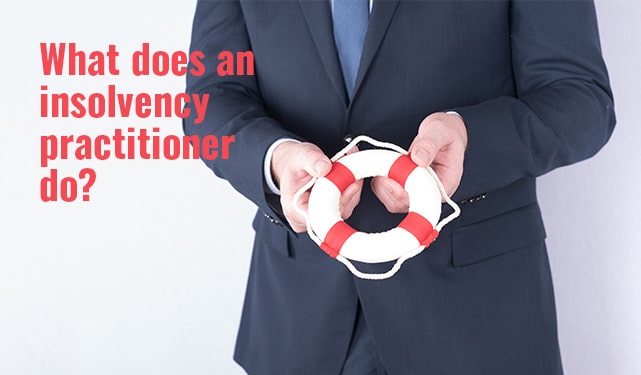The 5-Second Trick For Insolvency Practitioner
Table of Contents6 Simple Techniques For Insolvency PractitionerAbout Insolvency PractitionerNot known Facts About Insolvency PractitionerThe smart Trick of Insolvency Practitioner That Nobody is Talking AboutThe Ultimate Guide To Insolvency Practitioner
Whether or not you require to utilize an insolvency specialist (IP) to liquidate your company depends on numerous aspects. While engaging an insolvency expert for all kinds of liquidation is not a legal need, doing so can usually enhance the process and ensure compliance with lawful needs. Liquidating a firm is an essential decision that comes with substantial effects.

It is a procedure utilized when a company does not have any type of lenders, or all of their financial institutions can be repaid completely with statutory passion. Understanding the different types of bankruptcy processes can aid you figure out the finest strategy for your firm's liquidation or other official insolvency treatments itself.
This is compulsory in order to stick to lawful needs - Insolvency Practitioner. This is because IPs have the essential certifications and experience to guarantee that the liquidation procedure is performed in accordance with all appropriate legislations and policies. By involving a certified insolvency practitioner, you can have comfort understanding that your firm's liquidation procedure will certainly be handled expertly and in compliance with the pertinent legal needs
The Ultimate Guide To Insolvency Practitioner
The insolvency practitioner is selected as a liquidator and is liable for managing the business and liquidator's financial debts outstanding obligations and possessions. This process involves selling off the company's properties and dispersing the profits to lenders. Upon completion of the procedure, the company is gotten rid of from the register at Firms House.
Stopping working to do so can result in individual responsibility for the company or supervisor for the financial institution's debts. Voluntary liquidation, which includes Creditors' Volunteer Liquidation (CVL) and Participants' Volunteer Liquidation (MVL), is launched by the company's directors and shareholders when they can no more pay their financial obligations. In a CVL, the insolvency professional is assigned as the liquidator, in charge of taking care of firm financial debts and all firm properties.

7 Simple Techniques For Insolvency Practitioner
By examining the competence and experience of prospective bankruptcy experts, you can ensure that you pick a practitioner that has the essential certifications to manage your business's liquidation process effectively. While bankruptcy practitioner-led liquidation is typically one of the most proper course of activity for companies facing bankruptcy, there are different approaches to consider, such as striking off and partial liquidation.
It's important to examine all available alternatives prior to picking the following finest option or strategy for your company. Striking off business' signs up is a more straightforward and cost-efficient great post to read means to shut inactive or small firms without financial debts or possessions. To strike off a business, its name is removed from the Companies House register by submitting form DS01.
Prior to choosing for striking off, it's crucial to evaluate the benefits and downsides of this approach and take into consideration whether it's the ideal option for your organization. Partial liquidation is one more alternative to insolvency practitioner-led liquidation, in which a business sells off learn this here now specific possessions and obligations while remaining to operate with the remaining assets and responsibilities.
A Bankruptcy Practitioner will have the ability to encourage you of the most effective course of activity to take and make certain that whatever runs smoothly. Unfortunately, it is not feasible to liquidate a company without a liquidator. Designating an authorised insolvency specialist is required for the procedure of volunteer liquidation to begin.
A Biased View of Insolvency Practitioner
It is feasible to shut and liquidate your company without using a liquidator, supplied your company is solvent and you fulfill the eligibility requirements to liquify or liquidate it. Nevertheless, if your firm is bankrupt, you may be required to utilize a liquidator and begin official bankruptcy treatments. Right here are a few other helpful write-ups regarding business liquidation in the UK:.
Being in a setting where you're unable to pay your company's financial institutions is extremely difficult. In an attempt to stay clear of enhancing the level of debt, numerous firms attempt to work out straight with their creditors and accept a casual arrangement. If the financial obligation is rather small and owed to one creditor, and the financial institution is being cooperative, getting in right into an casual financial obligation plan is most likely the most effective solution, as opposed to searching the internet for 'an insolvency professional near me'.
On the various other hand, if there are numerous lenders and the degree of financial debt is big, financial institutions might not be so prepared or participating. In order to stay clear of liquidation or personal bankruptcy, it is far better to employ a bankruptcy specialist to formulate formal propositions and discuss with financial institutions in your place.
Things about Insolvency Practitioner
Whilst it is a means to manage debt, there are significant risks included with this kind of financial debt arrangement - Insolvency Practitioner. If a financial institution agrees to become part of an informal plan (IA) where the debtor has accepted make routine, if lower, repayments to pay off the financial debt, it's vital to adhere to the contract

The creditor is within their rights to back out of the contract and request the courts for your firm to be liquidated at any time. An official arrangement that has been recommended by a bankruptcy practitioner in your place, and concurred by a lender, gives a much more secure option.
Comments on “Top Guidelines Of Insolvency Practitioner”